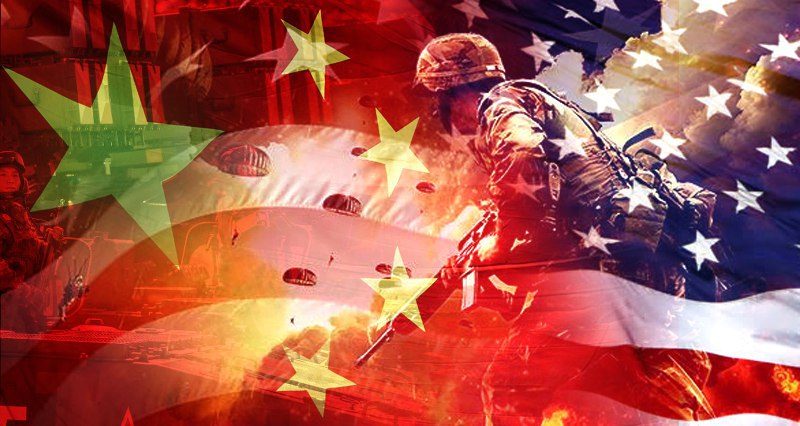In the latest edition (January / February) of Foreign Affairs, the Council on Foreign Relations’ (CFR) central media organ, an article was published by Fareed Zakaria entitled The New China Scare. In the article, Zakaria points out how US foreign policy is increasingly oriented against China. He believes that this is not only an unrealistic goal, but also contends that a Cold War between China and the United States would prove extremely costly for Washington.
🤔 Fareed Zakaria about the future of China-US relationshttps://t.co/DPC2Zri95D#ForeignPolicy #US #China pic.twitter.com/vIabRs0VGT
— United World International (@uwidata) January 7, 2020
The article emphasizes that China, the world’s largest economy, has been challenging the US for hegemony, and that the United States has been unable to develop a positive, decisive or long-term strategy to meet this challenge. The US’ aggressive and provocative foreign policy is heavily criticized in the article, while Sino-US relations are presented as a test for the United States. The article suggests that US foreign policy has pushed the country to the brink of disaster over the past several decades, and suggests that a “calm, inclusive and long-term” strategy be adopted.
It is a well-known fact that the United States has had a hegemonic status throughout the world for years as a result of the strength of the dollar and the country’s technological reach. China, which is catching up to the United States both technologically and economically, has seemingly become a nightmare for America, which is helplessly watching its claim to absolute sovereignty slip away.
The article highlights the following topics:
TREATING CHINA AS AN ENEMY IS A FLAWED STRATEGY
The article draws attention to a new consensus among American political parties, military organizations and key elements of the media. The new consensus is that China poses a vital threat to the United States, both economically and strategically. At the same time, it is believed that US policy towards China has failed and that Washington needs to take stronger steps.
The article suggests that Americans have developed an almost instinctive hostility toward China– according to polls, some 60% of Americans have a negative view of the socialist republic. Since the Pew Research Center began asking the question in 2005, that number has been growing higher and higher, and has now reached an all-time high. Americans have been taught to believe that China seeks to dominate the entire world.
The author says that if the US fails to solve this problem, it could face its biggest foreign policy failure in decades. If the United States enters into a new Cold War with China, it would last much longer and be far more costly than the decades long conflict with the Soviets.
China’s military strength is considerable: the country has a long-term and a systematic plan. If Washington defines every development and effort China makes as a threat, it will effectively position itself against the natural dynamics of the international community. It is suggested that this could even result in an actual war between the rising power and the anxious hegemon.
CONTAINMENT IS NOT REALISTIC
The text also includes on-going discussions from within the United States. The more aggressive and hard-line hawks are pushing for a new Cold War with China, assuming that only a policy of containment can defeat China. However, again, China is not the Soviet Union. China is the US’ equal in many fields, and even surpasses it in terms of population size, market and foreign exchange reserves.
The Pentagon describes China as a ”major strategic rival,” which the author reminds us does make sense as far as the Pentagon is concerned due to the fact that, despite the US’ incredible military might, the country has failed to defeat even under equipped enemies plagued with serious financial difficulties. With this in mind, Zakaria suggests that “creating an enemy from China, warmongering against a military superpower and a state that uses the most advanced technology, means returning to the ‘golden age’ of the Cold War era for the Pentagon.” However, such a “Cold War” against China would cost the United States far too much. It would disrupt the US economy and severely over-inflate the defense industry.
The author adds that the United States and China are far too intertwined both economically and in numerous other areas of cooperation: “There are thousands of Chinese people living in the United States; the most talented of the youth are coming to the US from China, and are we going to close our doors to them?” Zakaria points out that the Trump Administration asked 61 countries to impose sanctions on Huawei, but only three of its closest allies agreed, which does not bode well for future anti-Chinese initiatives.
PUTTING PRESSURE ON CHINA MIGHT BACKFIRE
China is a major trading partner for numerous countries, and many leaders would not agree to cut ties with Beijing even if it was possible. When Trump asked one country’s president about taking a side in the argument, the leader responded: “Please don’t ask us to choose between the United States and China. Because you won’t be happy with the result!”
An isolated China will build its own supply chain and technology, Zakaria continues, stressing that China will soon be able to render itself invulnerable to US pressure.
The article proposes that China be integrated into the international system rather than isolated, suggesting that the United States can only compete with China in a stable international framework.
As China’s economy continues to expand, understand the implications on the global stage by signing up to receive our newsletter, China Brief, written by @BeijingPalmer. Get in-depth analysis on how the country’s politics, commerce and technology:https://t.co/7toGIvWjiF pic.twitter.com/nTiTaJiOfL
— Foreign Policy (@ForeignPolicy) January 3, 2020
THE FORMER WORLD ORDER IS NOT SUSTAINABLE
The former world order, where small European countries act as the central global actors while giants such as China and India, according to Zakaria, are excluded from their executive ranks, is no longer sustainable.
The rise of China and its path to becoming a global power is described as a “decisive development that will affect the centuries-old international system.”
The article suggests that the United States can only succeed with a strategy that makes room for China and incorporates it into the international mechanism, suggesting that a hostile foreign policy that targets China is doomed to fail.
“China has struggled for years to play a broader role in the Asian Development Bank, but the United States has prevented it. As a result, China established its own multinational financial institution, the Asian Infrastructure Investment Bank.”
THE US’ CONFESSION
This important article can in some sense be seen as a US-based strategist’s personal confession. Zakaria essentially accepts the thesis of a coming multipolar world and proposes that the United States give up its claim to be the world’s only superpower.
Zakaria continues: “if we harden, we will be harmed.” He adds that China should be seen as a leading power and argues that by integrating China into the international system, the United States can limit it and block its power more effectively.
He even goes as far as to say that Western countries can and should take part in the Belt and Road Initiative in order to gain access to China’s incredible network and rising power.









Leave a Reply